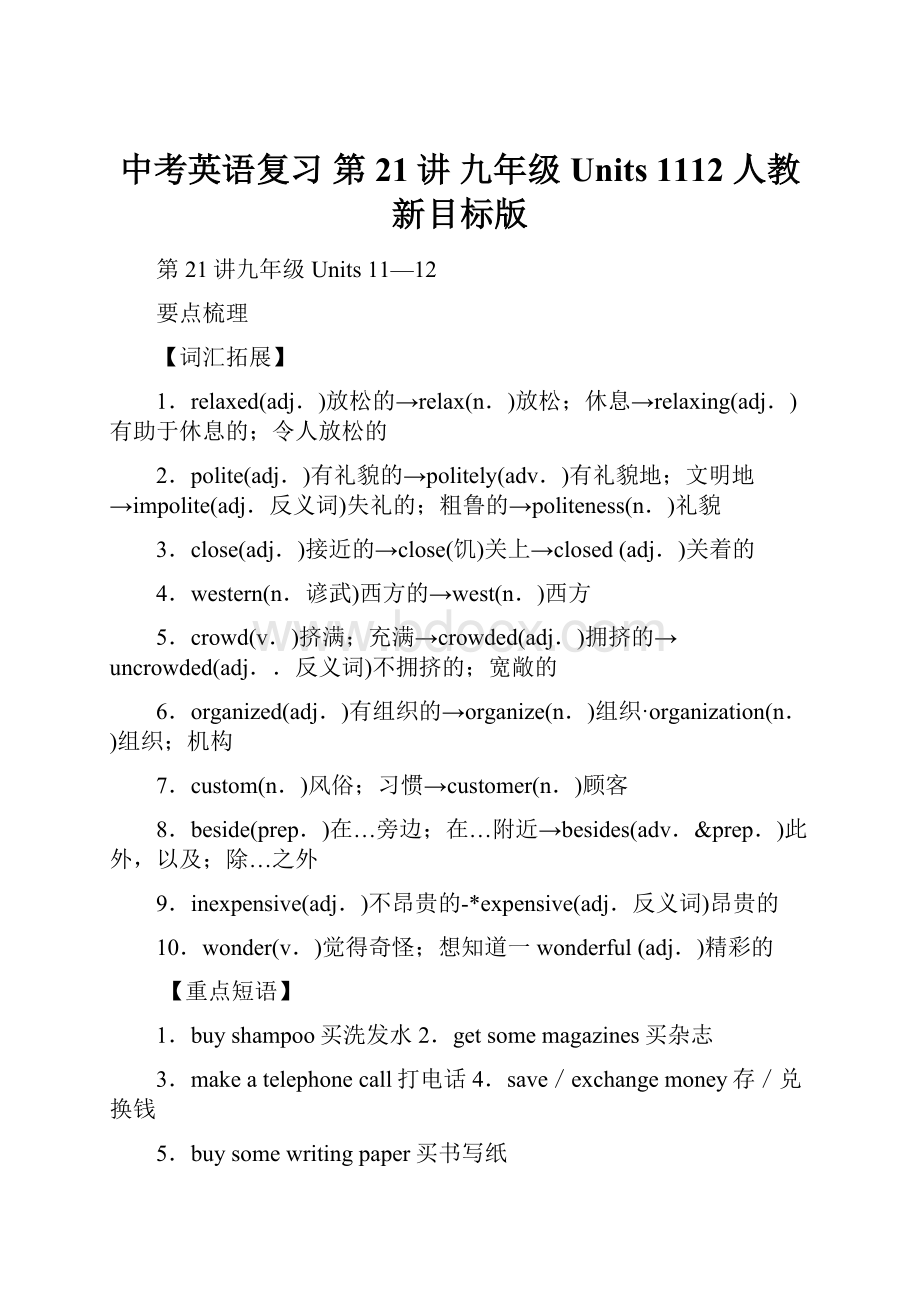中考英语复习 第21讲 九年级 Units 1112 人教新目标版.docx
《中考英语复习 第21讲 九年级 Units 1112 人教新目标版.docx》由会员分享,可在线阅读,更多相关《中考英语复习 第21讲 九年级 Units 1112 人教新目标版.docx(23页珍藏版)》请在冰豆网上搜索。

中考英语复习第21讲九年级Units1112人教新目标版
第21讲九年级Units11—12
要点梳理
【词汇拓展】
1.relaxed(adj.)放松的→relax(n.)放松;休息→relaxing(adj.)有助于休息的;令人放松的
2.polite(adj.)有礼貌的→politely(adv.)有礼貌地;文明地→impolite(adj.反义词)失礼的;粗鲁的→politeness(n.)礼貌
3.close(adj.)接近的→close(饥)关上→closed(adj.)关着的
4.western(n.谚武)西方的→west(n.)西方
5.crowd(v.)挤满;充满→crowded(adj.)拥挤的→uncrowded(adj..反义词)不拥挤的;宽敞的
6.organized(adj.)有组织的→organize(n.)组织·organization(n.)组织;机构
7.custom(n.)风俗;习惯→customer(n.)顾客
8.beside(prep.)在…旁边;在…附近→besides(adv.&prep.)此外,以及;除…之外
9.inexpensive(adj.)不昂贵的-*expensive(adj.反义词)昂贵的
10.wonder(v.)觉得奇怪;想知道一wonderful(adj.)精彩的
【重点短语】
1.buyshampoo买洗发水2.getsomemagazines买杂志
3.makeatelephonecall打电话4.save/exchangemoney存/兑换钱
5.buysomewritingpaper买书写纸
6.taketheelevator/escalatorto…乘电梯/扶梯到……7.turnleft/right向左/右转
8.takeavacation度假9.dressupasclowns打扮成小丑
10.takedancelessons上舞蹈课11.1endsb.sth./lendsth.tosb.把某物借给某人
12.askforinformationorhelp询问信息或求助13.makerequests请求
14.dependon依靠15.1eadintoaquestionorrequest导人问题或要求
16.between...and...在……和……之间
17.agoodplacetoeat/hangout吃饭/闲逛的好地方
18.theworld’slargestwaterslides世界上最大的水滑道
19.ontheotherhand在另一方面20.insomesituations在某些场合
21.inorder(not)to为了(不)……22.tablemanners餐桌礼仪
23.(not)talkatthetable(不要)在饭桌上说话
24.pickupthebowltoeat端起碗吃饭
25.wipeyour,mouthwithyournapkin用餐巾擦嘴
26.(not)makenoisewhileeating.(不要)在吃东西时发出声音
27.(not)stickthechopsticksintoyourfood(不要)把筷子插入食物里
28.(not)pointatanyonewithyourchopsticks(不要)用筷子指向任何人
29.besupposedtodosth.应该做某事30.shakehands握手
31.makemistakes犯错误32.berelaxedabout对……随意
33.dropby顺便拜访34.makeplanstodosth.制订计划做某事
35.get/beangry生气36.gooutofone’swaytodosth.特地(不怕麻烦)做某事
37.makesb.feelathome使某人感到宾至如归
38.be/getusedto(doing)sth.习惯于(做)某事
39.finditdifficulttodosth.发现做某事困难40.makeappointments约会
41.givecompliment赞美,恭维42.makeatoast祝酒;敬酒
43.haveonlineconversationswithsb.和某人网上聊天
44.makefaces做鬼脸45.can’tstopdoingsth.禁不住做某事
46.1earn...byoneself自学
47.forthefirsttime第一次48.thewrongway(用)错误的方式
49.ontime准时50.thelandofwatches手表王国
51.afterall毕竟,终究52.firstofall首先53.writtenEnglish书面英语
54.inthetraditionalway用传统的方式55.atthepropertime在适当的时间
【重点句型】
1.Excuseme.Couldyoupleasetellmewheretherestroomsare?
打扰一下,你能告诉我洗手间在哪儿吗?
2.Excuseme.DoyouknowwhereIcanbuysomeshampoo?
打扰一下,你知道我在哪儿能买到洗发水吗?
3.Couldyoutellmehowtogettothepostoffice?
你能告诉我怎样到达邮局吗?
4.Canyoutellmewherethere’sagoodplacetoeat?
你能告诉我哪儿有吃饭的好地方吗?
5.CouldyoupleasetellmeifthereareanygoodmuseumsinNewtown?
你能告诉我在新镇有没有好的博物馆?
6.Doyouknowifthereareanypublicrestroomsaroundhere?
你知道这儿附近有没有公共厕所吗?
7.-Whatareyousupposedtodowhenyoumeetsomeoneforthefirsttime?
当你第一次遇到某人时,你应该做什么?
-You’resupposedtoshakehands.你应该握手。
8.-Whenwereyousupposedtoarrive?
你应该什么时候到达?
-1wassupposedtoarriveat7:
00.我应该在7点钟到。
9.Youshouldhaveaskedwhatweresupposedtowear.你本应该问一问你该穿什么衣服。
10.Youaren。
’tsupposedtomakenoisewhileeating.你不应该在吃东西时发出声音。
11.Youshouldn'teatordrinkwhilewalkingdownthestreet.你不应该在沿街走路时边走边吃喝。
12.It'spolite/rudetodo………是礼貌的/粗鲁的。
考点精讲
【重点单词短语】
1.inorderto为了……
(1)inorderto常在句中作目的状语,其否定形式
为inordernotto。
如:
Inordertocatchtheearlybus,Ihadtogetupbefore6o’clockthatmorning.为了赶上早班车,那天早上我不得不在6点之前起床。
(2)order(n.),意为“命令,指令”。
(3)order(n.),意为“顺序,次序”,inthecorrectorder意为“按照正确的顺序”。
(4)order(v.),意为“点菜;命令,订购”,ordersb.todosth.命令某人做某事。
适时点津
inorderthat意为“为了……”,inorderto后跟动词原形,而inorderthat后跟从句,相当于sothat。
如:
Theyflewthereinorderthattheymightbeintimetoattendtheopeningceremony.他们坐飞机去那里以便能及时参加开幕典礼。
活学活用
Inorderbelate,Ihadtorushtothebusstopbreakfast.
A.tonot;withB.notto;withC.tonot;withoutD.notto;without
解析:
本题考查inorder(not)to表目的,withoutbreakfast意为“来不及吃早餐”。
答案:
D
2.trouble
(1)不可数名词,意为“困难,麻烦;困境;动乱,纠纷;毛病,故障”,词组:
beintrouble在困境中;getintotrouble陷入困境。
(2)不及物动词,意为“费神;费心”。
(3)及物动词,意为“使烦恼,使忧虑”。
如:
Thatstudentsometimestroublestheteacher
withhardquestions.那个学生有时候问难答的问题让老师头痛。
适时点津
做某事有困难:
havetroubleindoingsth.
活学活用
-IhavegreatinlearningmathandI’msoworried.Couldyouhelpme?
-Sure.I’dbegladto.
A.troubleB.interestC.joyD.fun
解析:
本题考查名词辨析,havegreattroubleindoingsth.,意为“做某事有困难”。
答案:
A
3.prefern更喜欢
(1)preferdoingsth.,意为“(两者比较)更喜欢…。
如:
Iprefergoingtobedearlier.我更喜欢早点睡觉。
(2)preferAtoB,意为“比较A和B,更喜欢A”。
如:
Ipreferjazztorockmusic.我喜欢爵士乐胜过摇滚乐。
(3)preferdoingtodoing,意为“更喜欢做……而不愿做……”。
如:
Jimprefersstayingathometogoingout.吉姆喜欢待在家里而不喜欢出去。
(4)Drefertodoratherthando,意为“宁愿(愿意)……而不愿……”。
如:
Iprefertostayathomeratherthangoshoppingwithyou.我宁愿待在家里也不愿意和你一起去买东西。
活学活用
(2010·安徽)-DoyouoftenwatchManandNatureonTV?
-Sometimes.It’saninterestingprogram,butISportsNews.
A.preferB.wantC.enjoyD.miss
解析:
本题考查动词辨析,答语后半句指“比起《人与自然》节目更喜欢《体育新闻》”。
答案:
A
4.relax.v.&n.放松。
轻松
(1)relaxed是形容词,意为“松弛的,缓和的,松懈的”,通常用来修饰人。
如:
He’sfeelingrelaxednow.他现在感觉轻松多了。
(2)relaxing是形容词,意为“轻松的,放松的”,常修饰物。
如:
Readingisrelaxing.阅读让人放松。
活学活用
Teresaispretty(轻松的)abouttime.Shethinksitisokayifyouarrivelate.
解析:
词组berelaxedaboutsth.意为“某人对某事不太在意”。
答案:
relaxed
5.pointat指向
(1)point用作不及物动词时,常直接接介词表示“指向”,也可以用pointto表达。
但二者的用法有区别:
pointat侧重表示指向距离较近的事物,at是介词,着重于指的对象;pointto则侧,重表示指向距离较远的事物,to是介词,着重于指的方向。
如:
Marypointedattheclothesandaskedmetotrythemon.玛丽指着衣服,让我试穿。
Thepolicemanpointedtothenorthandtoldmethewaytothestation.警察指向北方,告诉我到车站的路。
(2)point用作名词时有多种意义,意为“要点;分数;尖;尖端”等。
如:
Pleaselookatthesepoints.请看这些要点。
Doyouhaveapencilwithasharperpoint?
你有削得更尖点儿的铅笔吗?
活学活用
Whenyouaretalkingwithothers,don’tpointotherswithyourchopsticks.
A.ofB.atCwithD.for
解析:
指着某人,词组为pointatsb.。
答案:
B
【重点句型】
1.Couldyoupleasetellmewheretherestroomsare?
请问洗手间在哪里?
(1)Couldyoupleasetellme…?
是问路或问处所的常用句型,通常应先说Excuseme,以引起对方注意,也表示尊重对方。
如:
Excuseme.CouldyoupleasetellmewhereNo.101MiddleSchoolis?
打扰了。
请问第101中学在哪儿?
(2)本句含有where引导的宾语从句。
关于宾语从句应注意以下四个问题:
引导词;主从句时态要对应;当宾语从句是疑问句时,要用陈述语序;句尾标点要根据主句判断。
适时点津
could比can更婉转些,意思是一样的。
活学活用
(2011·十堰)-Canyoutellme?
-Hishomeisquitefarawayfromtheoffice。
I
think.
A.whenhegotupB.whereheworks
C.whyheboughtthecarD.howhelikeshisjob
解析:
根据回答“他家离办公室比较远”,知道问原因。
答案:
C
2.There’Salwayssomethinghappening.总会有事发生。
(1)本句是含有therebe句型的简单句。
happening作something的后置定语。
句型“Therebe+主语(sb./sth.)+doingsth.”表示“(主语)正在做某事”。
如:
Therearethreestudentsreadinginthereadingroom.阅览室里有三名学生正在看书。
(2)doingsth.是现在分词短语作定语,用来修饰sb./sth.。
大家一定要牢记:
单个的现在分词多作前置定语,现在分词短语多作后置定语。
如:
Shenevertroublesherstudyingbrother.他从不打扰她正在学习的哥哥。
活学活用
Look,therearesomestudentsthere.Let’sgoandjointhem.
A.swimB.toswimC.swimmingD.swims
解析:
本题考查Therebe…doing句式。
答案:
C
3.Inyourcountry。
whatareyousupposedtodowhenyoumeetsomeoneforthefirsttime?
在你们国家。
人们第一次见面应该做些什么?
(1)besupposedt0是被动语态结构,译成汉语时,常根据中国人的习惯译为“被认为……;被期望或要求;应该”。
如:
Everybodyissupposedtoknowthelaw.人人都应该懂得法律。
(2)forthefirsttime意为“第一次”。
如:
Forthefirsttimelwenttothatbeautifulplace,
Ifellinlovewithit.第一次去那个美丽的地方,我就喜欢上那里。
活学活用
(2010·通化)Studentsareoudlyinthereadingroom.
A.oldB.supposedC.notsupposedD.allowed
解析:
本题考查动词辨析,学生不允许在阅读室大声喧哗,故应为benotsupposedto
答案:
C
【巧辨异同】
1.information.news与message
(1)information是不可数名词,指通过学习、阅读等方式而获得的“信息;情报”等。
“一条信息”应说apieceofinformation。
如:
HewantedtogetnewinformationfromtheInternet.他想从网上获得新信息。
(2)news意为“新闻;消息”,是不可数名词,指公众感兴趣的、近来发生的事情,尤其指通过广播、电视、网络等报道的事件。
(3)message一般指口头传递或书写的“音信”,是可数名词。
活学活用
-TheInternetissoonvenientthatwecangetallwewanted.-That’sright.Itisveryhelpfulinourlivesnow.
A.theinformationB.aninformationC.theinformations
解析:
information为不可数名词,故不能加S。
答案:
A
2.instead与insteadof
(1)instead作副词,意为“相反,代替,反而,却”,表示没做前面的事而做了后面的事。
如:
Hewantedtobeasinger,buthebecameadoctorinstead.他想当歌手,但却成了一名医生。
(2)insteadof意为“而不是;代替”,是一个固定词组,后面跟名词、代词或动名词作宾语。
如:
NowIcandrivetoworkinsteadofwalking.现在我可以开车去上班而不必步行了。
活学活用
Whataniceday!
WeshouldgosightseeingwatchingTVinthehotel.
A.becauseofB.insteadofC.togetherwithD.outof
解析:
根据句意,我们去看风景而不是看电视,insteadof后跟名词或动名词。
答案:
B
真题剖析
真题1(2011·苏州)Ifyoudon’tworkenough。
Idon’tthinkyourdreamwillcome
A.hardly;trulyB.hardly;trueC.hard;trueD.hard;truly
解析:
ha一可作副词,意为“努力地”,实现(梦想)“cometrue”。
答案:
C“
真题2(2011·衢州)-MayIborrowthesetwobooks,please?
-Yes,youcan
themfortwoweeks.
A.borrowB.lendC.buyD.keep
解析:
本题考查动词辨析,borrow,lend,buy都为短
暂性动词,fortwoweeks为持续时间,故应用keep。
答案:
D
真题3(2010·武汉)-whyareyoustillwaitinginline?
-I’vemissedmy.
A.placeB.orderC.turnD.time
解析:
本题考查名词辨析,missone’Sturn,意为“错过号”。
答案:
C
真题4(2011·福州)-Couldyoutellme?
-Sure.Thedayaftertomorrow,
A.whenwillyouleavefortheU.S.A
B.whenMLeewillcome
C.whenyourfatherreturned
解析:
本题考查Couldyouplease…加宾语从句。
A答案语序错误,C答案时态错误。
答案:
B
真题5(2011·青岛)-Iwonder-I’mafraidwe’11belate.
AhowwecanbeontimeBwhatwearegoingtodo
CwhywegettoschoollateD.ifwewillarriveatthemeetingontime
解析:
本题考查宾语从句的用法。
由上句的“Iwonder...”及答语,可以看出宾语从句的引导词应为if,故答案选D,句意为:
一我怀疑我们是否能按时到会。
一恐怕我们会迟到。
答案:
D
名师预测
()1.-Doyouthinkyesterday’smathproblemwasdifficult?
-Yes.Icouldworkitout.
A.hardlyB.easilyC.finallyD.nearly
()2.-Iwanttoknow一WhynotgototheBlueLake?
That’sagoodplace.
A.whyIcangofishingB.whereIcangofishing
C.whenIcangofishingD.whoIcangofishingwith
()3.-Couldyoupleasepassmethebook?
-
A.Yes.IcouldB.No.Ieouldn’t
C.Sure.HereyouareD.No,that’snoproblem
()4.Pleasetellme.Ihavesomegiftsforhim.
A.howhasRobertcomeB.whereRobertis
C.whenwillRobertleaveD.whatdoesRobertlike
()5.-Areyousureyoucandowellintomorow’stest,Lucy?
-.l’vegoteverythingre